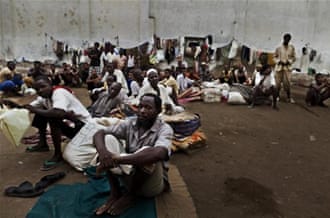By Alexandra Sandacz
Impunity Watch Reporter, Europe
PRAGUE, Czech Republic – On Monday, the upper house of the Czech parliament impeached outgoing President Vaclav Klaus for treason. The charges arise over his amnesty of thousands of prison inmates and others.
On January 1, President Klaus ordered more than 6,000 inmates serving short prison terms to be released. Furthermore, his amnesty stopped court proceedings in several fraud cases because he wanted to stop “endless criminal proceedings.” These proceedings lasted for more than eight years and caused widespread public anger.
As a consequence, a dozen high-profile corruption cases, some which involved millions of dollars in asset-stripping, bribes, and fraud, were thrown out.
38 out of an 81-seat house voted to impeach the president for his New Year amnesty. Only the Senate has such power in the Czech legal system.
The senators also accuse Klaus of violating the constitution when he refusing to ratify several European treaties, and for “refusing to rule on the appointment of judges despite being ordered by courts to do so”.
Klaus’s opponents do not necessarily want to punish the former president. However, they want to clarify the rules for the future.
Senator Miroslav Antl stated, “We want to know how far a president [is permitted] go.”
Petr Necas, prime minister and chairman of the conservative Civic Democratic Party, called Klaus’s move “an attack on our country’s reputation … It is purely motivated by personal hatred.”
The Czech citizens also oppose Klaus’s orders. More than 73,000 Czechs have signed a petition backing the charges of treason, and numerous Klaus portraits have been torn down in schools and offices.
However, Vaclav Klaus stated he does not regret the amnesty and “would do it again in absolutely the same way”. Moreover, Klaus rejected the accusations that said he deliberately formulated the amnesty to free serious criminals.
The Constitutional Court expects to deal with Klaus’s case quickly, but it is still likely to be weeks before a verdict is announced.
The worst punishment Klaus faces is the loss of his presidential job, a role the 71-year-old will terminate later this week after serving two full terms in office. However, he will most likely not be able to run again.
If found guilty, Klaus will also lose his state pension as a former president that equals about $5,000 a month.
For further information, please see:
BBC News – Czech President Vaclav Klaus Faces Treason Charge – 4 March 2013
Financial Times – Vaclav Klaus Faces Treason Charges – 4 March 2013
Reuters – Czech Upper House Votes to Impeach President Klaus – 4 March 2013
The Washington Post – Czech Parliament’s Upper House Agrees to Charge President Vaclav Klaus with High Treason – 4 March 2013


